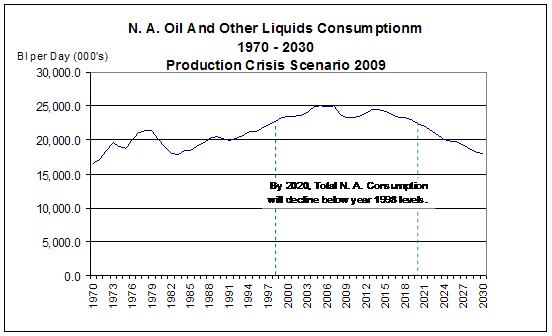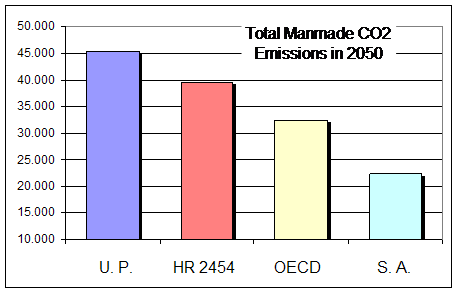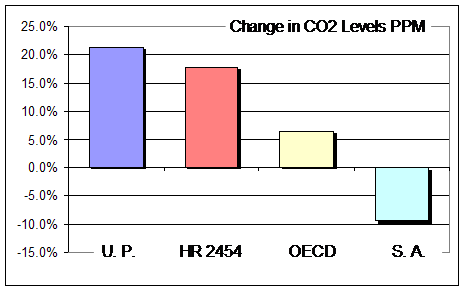American Clean Energy Act Is Not Going Anywhere
Politics / Energy Resources Jul 24, 2009 - 08:38 PM GMTBy: Ronald_R_Cooke

 If you have read my book “Detensive Nation”, you know I am concerned about the damage we humans are doing to our environment. Our intensive consumption of energy, arable land, fresh water, and minerals is not sustainable. That means we humans will be forced to adopt a detensive Cultural EcoSystem. In order to ease the pain of this transition, we need a positive, proactive, and intellectually honest political system.
If you have read my book “Detensive Nation”, you know I am concerned about the damage we humans are doing to our environment. Our intensive consumption of energy, arable land, fresh water, and minerals is not sustainable. That means we humans will be forced to adopt a detensive Cultural EcoSystem. In order to ease the pain of this transition, we need a positive, proactive, and intellectually honest political system.
With these thoughts in mind, I am very disappointed with the intent of H. R. 2454. I prefer positive, constructive and practical ways to solve problems. Politicians, it would seem, favor negative, destructive and dumb ways to deal with our collective challenges.
This Bill is bad news.
The recently passed Energy Bill, H.R. 2454, The American Clean Energy and Security Act of 2009, was rammed through the House of Representatives by Pelosi, Waxman and Markey. This oppressive and irresponsible legislation is “unsalvageable” by the Senate. It proposes to decimate the generation of almost 70% of America’s electric power, creates a vindictive environmental policy, and ignores the reality of fossil fuel depletion.
Construction of new coal fired electric power generation would be subject to an insufferable load of government red tape and unlimited litigation. Even plant renovation, irrespective of the potential environmental benefits, would be challenged in court. And despite the CO2 reduction benefits, these people obviously do not want to generate electricity using nuclear power.
But wait. Where are we going to get our electricity? There is no indication this Bill’s proponents have ever made any attempt to assess how much energy America is going to need in order to sustain its economy and growing population. These people have proposed a pop-culture solution for a problem they have never properly quantified.
And then there is cap and trade.
With considerable ignorance of the economic and social consequences, 219 politicians voted to penalize all Americans with a Cap and Trade system that will raise the price of food, gasoline, propane, heating oil, diesel fuel, clothing and just about everything else we buy. There is even a plan (I am not making this up) to tax breathing.
As one should expect, most Americans don’t buy the argument we need a coercive cap and trade system to prevent damage from global warming. Nor should they. The only beneficiaries are lawyers, Wall Street financiers, and Washington insiders. And 220 politicians have proposed to embezzle the money to pay for this obvious scam from our collective wallets.
Is this what we want?
Deception or ignorance?
Among the Bill’s many faults is the incredibly absurd assumption (or deliberate deception) we humans have an unlimited supply of cheap fossil fuel resources. And based on this empty-headed speculation, the Bill’s proponents project manmade CO2 will exceed 14 Gt C/yr.
They should know better. I mean really, how credible is a conclusion based on half the data?
There are multiple books and reports that detail human consumption of oil, natural gas and coal. The production of all three fossil fuel resources will peak before 2075. In fact, we humans will never produce 14 Gt C/yr of CO2 from fossil fuels because there isn’t enough affordable (accessible) oil, natural gas, or coal left on this planet to produce that much CO2/yr. (Ref 1)
It troubles me that 219 members of Congress are so adamant in their determination to deceive us. It also troubles me that 212 other members of Congress are incapable of preparing a credible alternative energy plan. I mean – like – what the hell are these people doing?
Let me put it to you this way:
If you were doing a high school science project,
and you deliberately left out half the data,
what would your teacher say?
Oil depletion is upon us. We humans have consumed over 1 Trillion barrels of easy to get and inexpensive oil. It took us over 150 years. We humans are expected to consume another Trillion barrels of more difficult to get and definitely more expensive oil in 35 years. By 2040 we will start to consume a third Trillion of even more expensive barrels. Oil shortages are inevitable.
One can make similar evaluations for natural gas and coal. By 2050 our kids will be scrambling for anything they can afford to keep them warm in winter. There will not be any low cost heating oil, propane or natural gas. Nor will there be any cheap gasoline or diesel fuel for their vehicles.
But in its infinite wisdom, Congress has ignored fossil fuel depletion.
Dare we ask: Why?
Let’s look at oil.
America’s consumption of oil is declining. By 2020 we will consume less oil and other petroleum associated liquids than we did in 1970. We do not need cap and trade to achieve this reduction. It is already happening. Even a projected recovery of the American economy in ~ 2010 – 2011 will only provide a temporary blip of consumption. (Ref 2).

In terms of CO2 emissions, less oil consumption means less CO2. And since most nations are destined to consume less oil by 2020, and ALL nations will consume less oil by 2050, there will be a corresponding reduction of global CO2 emissions from oil and other petroleum associated liquids. No government action is needed. It will happen anyway.
About manmade CO2.
How much of a CO2 reduction can we expect? BP, EIA and NOAA data can be used to project total global oil consumption and manmade CO2 change through 2050. In the following two graphs, the data in the first three columns has not been adjusted to include fossil fuel resource depletion. The data in the forth column includes a calculation of the effect of oil depletion.
Unadjusted Projection (UP)
In the following Graph, Total Annual Unadjusted Projection of manmade CO2 increases from 28.3 MMT in 2005 to ~ 45.3 MMT in 2050. That is a projected 60% increase in manmade CO2 from 2005 to 2050. This is the erroneous data Congress used to justify cap and trade.
America goes it alone with HR 2454.
Now suppose House Bill 2454 passes intact. If the United States is the only nation to meet the CO2 reduction goals in HR 2454, then Total manmade CO2 emissions would increase by ~ 40% from 2005 to 2050 to ~ 39.5 MMT.
All OECD nations cooperate.
If, on the other hand, ALL of the OECD nations agree to duplicate America’s CO2 reduction goals (highly unlikely), then Total manmade CO2 emissions would increase by just over 14% from 2005 to 2050 to an annual total of ~ 32.4 MMT.
The Strategic Alternative
The last column in this Graph assumes we carefully calculate the global effect of oil depletion on CO2 emissions; and we develop a technologically viable and economically practical international program of energy development, efficiency and conservation. This simple plan would decrease Total Annual manmade CO2 emissions to 22.5 MMT in 2050. That’s a 21% decrease of manmade CO2. We do not need cap and trade. We don’t need government red tape.

About CO2 levels.
None of the published IPCC projections are credible. Because they ignore fossil fuel resource depletion. So let’s put things into perspective.
How much of an atmospheric CO2 reduction in PPM can we expect? In the following two graphs, the data in the first three columns has not been adjusted to include fossil fuel resource depletion. The data in the forth column includes a calculation of the effect of oil depletion.
Unadjusted Projection (UP)
Based on the assumption we humans will forever have an unlimited supply of cheap fossil fuels, Total CO2 levels increase from 377 PPM in 2005 to 457 PPM in 2050, a gain of ~ 21%.
America goes it alone with HR 2454
If House Bill 2454 passes intact, and the United States is the only nation to meet its CO2 reduction goals, then Total CO2 levels would increase by ~ 18% to 444.2 PPM by 2050. Total CO2 in PPM would decease by only ~ 2.8% versus the do nothing scenario.
All OECD nations cooperate
If ALL of the OECD nations agree to duplicate America’s CO2 reduction goals (highly unlikely), then Total CO2 levels would increase about 6.5% from 2005 to 2050. Compared with the do nothing scenario, OECD nations would bring total CO2 levels in PPM down by ~12%.
The Strategic Alternative
Including the effect of oil depletion decreases our calculations of Total CO2 levels to ~ 342 PPM in 2050. Oil depletion, in combination with a constructive energy plan, virtually guarantees that CO2 levels in PPM will decline by just over 9% from 2005 to 2050. This proposed scenario improves our chances of lowering atmospheric CO2 by more than 25% versus the erroneous do nothing case.

A better energy plan.
OECD nations – as a group - are unlikely to reduce their combined CO2 emissions by more than 30 – 35% by 2050. The reason is deceptively simple: the majority of voters will not accept the premise that CO2 emissions must be reduced through coercive and costly government action. And the results are unacceptable. By itself, H. R. 2454 would decrease American CO2 by only a miserable 2.8% One big volcano and it would all be a total waste of time.
We do not need to devastate our economy in the quest for an effective energy policy. If we acknowledge oil, natural gas and coal depletion, factor in national energy requirements, adjust the projections for improved energy efficiency, and fund a range of energy development programs, then:
we can create a lower cost, less intrusive,
and more constructive energy plan for America.
The key issues are energy cost, availability, and reliability. If we know that oil, coal and natural gas are going to be increasingly expensive and less available by 2050, and virtually depleted by 2100, then let’s build our energy plan around the real challenges that lie ahead. (Ref 3).
Conclusion
Oil depletion, in combination with a constructive energy plan, virtually guarantees that CO2 levels in PPM will decline by just over 9% from 2005 to 2050. We do not need cap and trade. We do not need to decimate our economy. We do need a thoughtful conclusion based on a careful analysis of all energy supply and demand information.
H. R. 2454 is going nowhere. And with good reason. The House Bill was based on deception, greed, ideology, and political hubris. What America needs is a bill that focuses on competent science, creative engineering, practical economics and sound program management.
Reference 1: A detailed analysis of oil production and consumption is presented in my book “Oil, Jihad and Destiny”. Our ecosystem challenges are discussed in my book “Detensive Nation”. Both books offer a series of practical solutions. Yes. We can do better.
Reference 2: All charts and data are based on my analysis of existing public information. It is presented without any warranty what-so-ever. Do your own homework.
Reference 3 My findings have been supported by NASA scientists. Relevant text and Graphs are available at :: http://tceenergy.blogspot.com/2008/01/evil-twins.html
Ronald R. Cooke
The Cultural Economist
Author: Detensive Nation
www.tce.name
Cultural economics is the study of how we interact with economic events and conditions. Culture, in this sense, includes our political systems, religious beliefs, psychology, history, customs, arts, sciences, and education. The term "Economics" refers to the extent and process of how we employ capital, labor and materials. If human existence is dynamic, then economics – as a science – must be able to characterize the interaction of culture and economics in contemporaneous terms.
Ronald R Cooke Archive |
© 2005-2022 http://www.MarketOracle.co.uk - The Market Oracle is a FREE Daily Financial Markets Analysis & Forecasting online publication.


